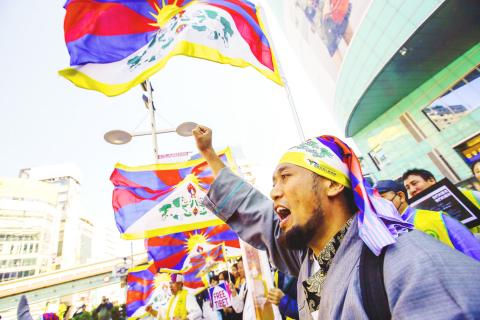About 200 people yesterday marched in downtown Taipei to commemorate the 1959 Tibetan Uprising, calling for an end to China’s oppression of Tibet.
Before the march, Tibetan rights advocates, including Democratic Progressive Party legislators Kolas Yotaka and Yu Mei-nu (尤美女), New Power Party Taipei city councilor nominee Lin Ying-meng (林穎孟) and members of the Human Rights Network for Tibet and Taiwan, the Taiwan Association for Human Rights and other groups rallied in front of a Pacific Sogo Department Store in Daan District (大安) in support of Tibetans fighting for freedom and human rights.
“On this day in 1959, tens of thousands of Tibetans — including monks, nuns and laypeople — held a peaceful protest against Chinese rule,” Tibet Religious Foundation of His Holiness the Dalai Lama chairman Dawa Tsering said.

PHOTO: EPA
“The Chinese government responded by launching a violent crackdown and killed many Tibetans. It was a day in Tibetan history that will always be remembered,” Dawa Tsering added.
Following the 1959 crackdown, Tibetans have continued to fight for their freedom and has organized many protests, he said.
In addition to being the 59th anniversary of the uprising, this year also marks the 30th anniversary of a 1988 movement opposing communism and the 10th anniversary of the 2008 Tibetan unrest, he added.
Since 2009, 152 Tibetans have self-immolated to protest Chinese suppression, he said, adding that on Wednesday, 44-year-old Tsekho Tugchak set himself on fire.
He expressed gratitude for people fighting for the Tibetan cause in Taiwan and around the world and called on Chinese President Xi Jinping (習近平) to review China’s Tibet policies and meet with the Dalai Lama to discuss ways to resolve problems in the region.
Taiwan Tibetan Welfare Association president Tashi Tsering also urged the Chinese government to allow Tibet’s spiritual leader to return home.
“The Dalai Lama and other Tibetans need to be able to return home,” he said, adding that they need a Tibet where the Dalai Lama lives, and where they can practice their religion and learn about their culture and language.
“We want Tibet to go back to how it used to be, not the empty shell it has become,” he added.
Taiwanese must continue asking what more they can do to help Tibet, Kolas said.
Although Taiwan has in the past two years amended its Immigration Act (入出國及移民法) to allow Tibetan exiles to legally reside in the nation and has abolished the Mongolian and Tibetan Affairs Commission, “which was a remnant of colonialism,” there is still much more Taiwanese can do, she said.
Participants sang the Tibetan national anthem and walked to Taipei 101 in Xinyi District (信義), carrying a large portrait of the Dalai Lama and Tibetan snow lion flags, shouting “free Tibet.”
An exhibition on the 2008 Tibetan unrest is on display at Liberty Square until Wednesday, when another event to mark the day is scheduled to take place at the square.

CALL FOR SUPPORT: President William Lai called on lawmakers across party lines to ensure the livelihood of Taiwanese and that national security is protected President William Lai (賴清德) yesterday called for bipartisan support for Taiwan’s investment in self-defense capabilities at the christening and launch of two coast guard vessels at CSBC Corp, Taiwan’s (台灣國際造船) shipyard in Kaohsiung. The Taipei (台北) is the fourth and final ship of the Chiayi-class offshore patrol vessels, and the Siraya (西拉雅) is the Coast Guard Administration’s (CGA) first-ever ocean patrol vessel, the government said. The Taipei is the fourth and final ship of the Chiayi-class offshore patrol vessels with a displacement of about 4,000 tonnes, Lai said. This ship class was ordered as a result of former president Tsai Ing-wen’s (蔡英文) 2018

‘SECRETS’: While saying China would not attack during his presidency, Donald Trump declined to say how Washington would respond if Beijing were to take military action US President Donald Trump said that China would not take military action against Taiwan while he is president, as the Chinese leaders “know the consequences.” Trump made the statement during an interview on CBS’ 60 Minutes program that aired on Sunday, a few days after his meeting with Chinese President Xi Jinping (習近平) in South Korea. “He [Xi] has openly said, and his people have openly said at meetings, ‘we would never do anything while President Trump is president,’ because they know the consequences,” Trump said in the interview. However, he repeatedly declined to say exactly how Washington would respond in

WARFARE: All sectors of society should recognize, unite, and collectively resist and condemn Beijing’s cross-border suppression, MAC Minister Chiu Chui-cheng said The number of Taiwanese detained because of legal affairs by Chinese authorities has tripled this year, as Beijing intensified its intimidation and division of Taiwanese by combining lawfare and cognitive warfare, the Mainland Affairs Council (MAC) said yesterday. MAC Minister Chiu Chui-cheng (邱垂正) made the statement in response to questions by Democratic Progressive Party (DPP) Legislator Puma Shen (沈柏洋) about the government’s response to counter Chinese public opinion warfare, lawfare and psychological warfare. Shen said he is also being investigated by China for promoting “Taiwanese independence.” He was referring to a report published on Tuesday last week by China’s state-run Xinhua news agency,

‘ADDITIONAL CONDITION’: Taiwan will work with like-minded countries to protect its right to participate in next year’s meeting, the foreign ministry said The US will “continue to press China for security arrangements and protocols that safeguard all participants when attending APEC meetings in China,” a US Department of State spokesperson said yesterday, after Beijing suggested that members must adhere to its “one China principle” to participate. “The United States insists on the full and equal participation of all APEC member economies — including Taiwan — consistent with APEC’s guidelines, rules and established practice, as affirmed by China in its offer to host in 2026,” the unnamed spokesperson said in response to media queries about China putting a “one China” principle condition on Taiwan’s